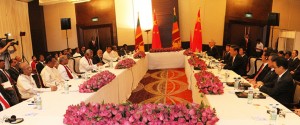News
China’s SL interest part of its global strategy, bilateral relations are secondary: DEW
To the dustbins of history have been kicked the old ideological differences that once existed between the supporters of the Moscow and Peking (Beijing) wings of the Communist Party (CP) of Sri Lanka, with new global political and economic realities burying past differences, said, stalwart of left politics and CP General Secretary, D.E.W. Gunasekera.

Mr. Gunasekera (First from left) was part of the parliamentary delegation led by Speaker Chamal Rajapaksa which met with visiting Chinese President Xi Jinping
“There are no ideological differences anymore between Moscow and Beijing. There is a realignment of forces in Asia, and Russia and China have moved fast to consolidate relations between their two nations,” said Mr. Gunasekera, whose CP was for many years aligned to Moscow, and opposed the Peking Wing of the CP.
It was a time when ideological differences between the two communist giants effectively divided loyalist forces across the world into two distinct factions, but Mr. Gunasekera, a Senior Minister in the ruling United Freedom People’s Alliance (UPFA), said such differences are a thing of the past. “That is history. We came together many years ago,” he said.
Mr. Gunasekera was part of the parliamentary delegation led by Speaker Chamal Rajapaksa which met with visiting Chinese President Xi Jinping for about an hour, said, he was introduced as the General Secretary of the CP of Sri Lanka, by the Chinese Ambassador in Colombo, and had a fruitful interaction with the Chinese President, along with several of his colleagues.
Mr. Gunasekera said that, as a constituent member of the ruling UPFA, it was supportive of the policies of the Government where Beijing’s role has become pivotal, but believes that, for China, its global position would take precedence over its bilateral ties.
“China’s interest in Sri Lanka is mainly, a part of its global strategy to assert and consolidate itself in the alliance of newly advanced economies named BRICS (Brazil, Russia, India China and South Africa). Bilateral relations are secondary to the global needs of China,” he added.
Mr. Gunasekera added that, this is a time that new liberal economic policies are the reality, and one that has to be accepted by all. “New problems will emerge as time goes on, as part of these policies, but no one can predict what they will be,” he said.

